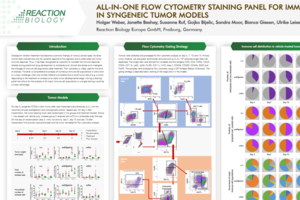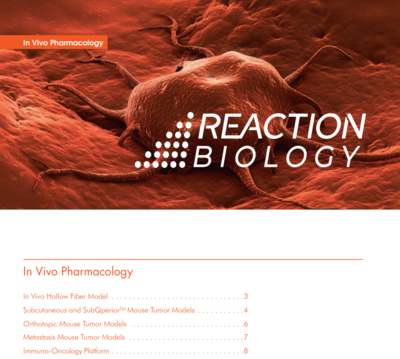Syngeneic Mouse Models
Syngeneic mouse models are used for efficacy testing of immuno-oncologic drugs and the investigation of the effects of conventional anti-cancer drugs on the immune system. In a syngeneic model, the tumor tissue was obtained from a mouse of the same genetic background as the immuno-competent recipient mouse. With the tumor microenvironment and transplanted cells belonging to the same strain, syngeneic models are powerful immuno-oncology models for investigating responses to anti-cancer therapies.
Our panel of cell line-derived syngeneic tumor models (CDX) comprises subcutaneous, subQperior, orthotopic, and metastasis models. Our innovative subQperiorTM tumor models are based on cell implantation into the mammary fat pad of mice and feature reduced tumor ulceration and yield more homogeneous tumor growth and ultimately outstanding statistical evaluation of drug efficacy testing.
In addition to standard syngeneic tumor models, Reaction Biology also offers proprietary tissue-based immuno-oncology models, named Mouse-derived Isograft Models (MDI).
- Science-driven study setup with a focus on reproducible and meaningful results
- Custom-tailored reports written by Ph.D. level medical writers will be provided for every in vivo study
- All procedures entail a meticulous documentation process according to GV-Solas requirements and are in-line with the ISO 9001 certification
- Regular syngeneic panel screening of 6 syngeneic tumor models for economic efficacy evaluation of new immuno-oncology drug candidates
- Comprehensive flow cytometry analysis capacity with 17 marker staining panel
Reaction Biology has a global network of business development managers to understand your specific research needs and help determine the right mouse models for your immunotherapy research thrust. Throughout the study, you will work with just one team of scientists to facilitate consistent communication. Inquire for our models today.






